When I started this blog something like 4 years ago, it was originally my goal to not talk about my job. There are enough music education/band director instructional help blogs out there, and frankly I wasn’t really interested in adding to their number. To be honest, in my 21 years as a band director, I’ve rarely read much about how to improve my teaching, outside of the monthly The Instrumentalist magazine. I don’t know if that’s good or bad; chances are, if you asked my students, they’d say “bad.” Maybe I should read more about teaching; I’ve just always maintained, that’s my job, but that doesn’t need to be my life. Let me read Twain, let me read histories, Dickens, biographies, humor….something that gives me a broader perspective of life and the human condition. That alone can make me a better teacher. Now whether that’s true or not….who knows.
Anyway, I digress, and in the first paragraph too; that’s not a good start! The reason I originally started this blog was to chronicle my experiences of wearing a boater hat. You see, when I first donned the boater, I wore it everywhere; it became my hat of choice. After a couple years, though, I became more educated in boater guidelines, and realized it was a formal hat; the summer alternative to a top hat, if you will. So, since 2017, it’s been only worn when I’m leading the UMass Marching Band in performance. I’ve got a regular uniform that, after this past fall, includes a burgundy blazer, bow tie (which I still haven’t mastered how to tie…it’s getting embarrassing), and, of course, the hat. So, when the hat became less part of my daily routine, this blog wandered. It’s occasionally touched on band, but for the most part, it’s been anecdotes, book and movie reviews, Catholicism, and an occasional short story. The UMass Band does pop in every now and then, but I’ve tried to make this blog a place apart from that. You know, that whole work/life separation. Speaking of which….how’s that supposed to go, again?

Your typical work outfit
There’s many things the coronavirus pandemic has taken from us and I don’t mean to make light of what anyone is dealing with. My wife is an ICU nurse and she’s facing this scourge at seemingly the front lines. It has absolutely put into perspective what I do, and my own problems. They seem pretty darn insignificant compared to the work she and her colleagues are doing every shift. My hat (boater or otherwise) will always be off to their service; I couldn’t be more proud.
But, as I was saying, in the wake of this pandemic and its social distancing, was the cancellation of all public events. For me, that meant no April concert for the UMass Concert Band. Most of our other musical ensembles give two performances a semester, and since the campus closing came at the halfway of the semester, they had already taken the stage once. But groups such as Concert Band, which only perform one time, we never saw the stage lights. Again….people are dealing with far worse from this virus; I don’t expect any sympathy. As far as I know, all of us are fine, and I pray it stays that way. Our last rehearsal before Spring Break, we treated as a default concert. At the time, we didn’t know if we’d be coming back to campus or not; we found out after the rehearsal. But some of us wore our concert attire, we set up chairs for an audience, and we live-streamed the rehearsal so families could watch. Our music wasn’t performance-ready, but we gave it a go, just for the heck of it. It was far from perfect….but it still had meaning. And when it got done, we recognized the seniors, which we would’ve done at the April concert.
In addition to the seniors, the April concert is where I would also recognize our graduate students. One of the things I’m blessed with at UMass is the opportunity to work with our Masters in Wind Conducting students. The way college bands typically operate is, in addition to full-time band directors, most universities have graduate students who are working to perfect their conducting/band directing skills. There’s only so much of that you get as an undergrad. A typical undergraduate music education student has two semesters of group conducting classes; the first semester is everyone learning how to move their hands, and then the second semester is separated into choral and instrumental. That’s where you start to specialize; how to read a musical score, more advanced gestures, and detecting player errors. And that’s about it. Next time you’re conducting is when you’re a student teacher. Then it’s off on your own as a public band director; let’s hope you got this! Who know, maybe you’ll find you’re the next Leonard Bernstein, while you’re teaching junior high band!
For those who desire advanced training, many universities (our included) offer are summer workshops, where 20 – 30 people such as yourself get 15 minutes a day to stand in front of a college group. You receive feedback from the clinicians, who are typically recognized, successful college band directors. I’ve done, I think, 3 of those over the years. They’re very humbling experiences, and that’s kind of why I go; it keeps me honest. Plus, I’ve always enjoyed interacting with the other participants. But just as there is only so much conducting you can get in an undergrad education, the same applies to these workshops. 15 minutes a day in front of a band made up of (usually) ringers can be eye-opening, but the deep improvement for yourself is probably limited. After all, you’re just waving your hands; you’re not really teaching the group. To really grow as a band conductor, beyond what you’ve been doing with your own high school groups, you go to graduate school.

You might ask, how does one study conducting? In a typical program, there’s a curriculum of music theory and history, not unlike what you did as an undergraduate. You then have private conducting lessons with the head band director at your institution. This is a big difference than undergrad, where there were 20 people in a conducting class. Now you’re working one-on-one with the “big cheese” for 60 minutes a week. And you’re always conducting one of the bands. You’ve got one piece on a usual concert cycle. Perhaps if its a large university, you and another graduate student have your own band; the campus bands, that require no audition. At UMass, we’re structured a bit different; my colleague, Dr. Matthew Westgate, conducts the two auditioned bands, Wind Ensemble and Symphony Band; and I conduct the non-auditioned, “come as you are” group, Concert Band. The graduate students conduct pieces with all the groups, but they study conducting with Dr. Westgate.
The conducting lessons are the educational part of graduate conducting study….but in my experience, both as a grad student and now as a college band director, there can be even more gained from the assistantships duty. In most cases, when you start a graduate conducting program, you’re not just a student. You’re not just accepted for study, you’re also given a teaching assistantship. The titles vary at institutions; some are called Teaching Assistants (TAs); others are called Graduate Assistants (GAs, or the less welcome but always popular, Grad Ass). Also seen, but rarer, and usually only for one doctoral student, is the Fellowship…..of the baton, not of the ring. But I digress.
The duties for an assistantship can vary; it may involve helping teach those afore-mentioned large undergraduate conducting classes. Sometimes it involves clerical work for the college band, such as helping with organizing music, or writing concert programs. One of the most common duties is working with the athletic bands. This is where I first encountered grad conductors, long before I ever dreamt I would be one. The University of Iowa, where I did my undergraduate studies, has a fairly good-sized School of Music, and a well-established graduate conducting program. There were always grad students with the Hawkeye Marching Band. They typically ran section rehearsals, conducted the band in the stands on football game days, and conducted the basketball pep bands. I didn’t realize it at that time because, well….I was stupid undergrad, but most of the graduate students who I encountered would later go on to very successful careers. Don Ryder, who was working on his doctorate, is currently the Director of Bands at the University of Tennessee. Mark Whitlock has been the Director of Bands at the University of Minnesota – Duluth for many years. The same goes for Karen Lavoie at Westfield State, right here in Western Massachusetts. Ken Thompson has been at Bowling Green for a while now; the same with Andy Mast at Lawrence Conservatory. Don Miller has been a college band director at a few different schools, as has Tom Keck. Brian Dewald and Rick Catherman have been highly successful, recognized high school band directors. I look back on it now and could kick myself for not taking advantage of their presence. Like I said, I was a stupid undergraduate. Not excusing myself, just telling it like it is…..or was, I should say.
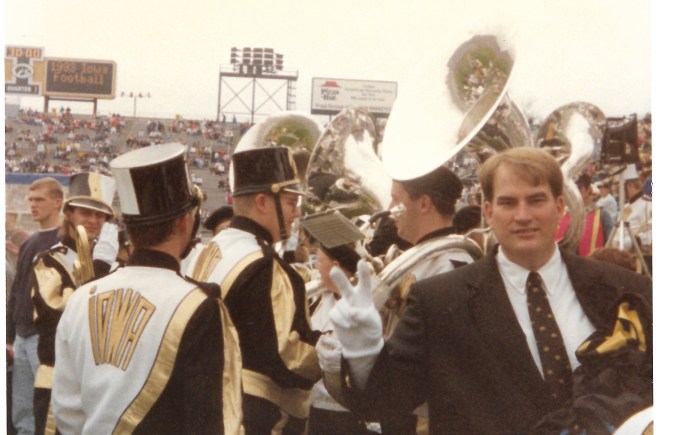
Don Ryder, now the Director of Bands at the University of Tennessee, while a graduate assistant at the University of Iowa
Some time later, when I was out on my own, teaching in State Center, Iowa, I thought of the idea of being a grad student myself. I don’t know if at those days, I thought I could be a college band director. I just yearned to see what it would be like to be around a big time collegiate band program, on the staff side. Just to get a taste of it, you know? And as much as I enjoyed teaching in small-town Iowa, the big time University seemed so exotic, something so different. I was always a big sports fan, and remembering from my experiences at Iowa that grad students with the band were common, I was drawn to looking at college that had prominent athletics. The thought was….the bigger the sports, the bigger the band involvement, and thus the bigger the need for staff. And so, not surprisingly, my eyes were drawn to the Southeast, to the Conference of Champions, and to a school that was winning not only in big time football, but basketball too. That was, of course, the University of Florida.

It was at Florida that I really got a taste for what college bands were all about. There’s not too many schools bigger, both in terms of total student population and sports, than UF. And between Dr. David Waybright an Prof. Matt Sexton, I received an experience that would shape me and set me on the path for the rest of my career….a path that brought me to where I am today…..sitting in my living room in Amherst, MA, under “shelter in place.” It’s not that Florida made me ready for something like this (no, not the shelter in place; being band director at UMass!); that would take another graduate school (the University of Illinois), 5 years of college teaching on my own (Fresno State), and some random circumstances of being in the right place at the right time on multiple occasions. But it was Florida that first showed me not only what college band were, but that I could have a place in them.
There’s many things I can extoll about the Wind Conducting program at UF, but for me, the greatest was that Dr. Waybright gave you a firm sampling of everything, found out what your strengths and interests were, and then provided you the opportunities to reach your goals. I don’t know if I came to Gainesville with the goals of being a collegiate marching band director, but call me a Seminole (please don’t) if my eyes didn’t light up at packed houses in the Swamp, of the Gator Chomp, the strains of Orange and Blue, and the whole ambience of SEC sports. Sure, I received conducting lessons, and I learned much of the band repertoire, through Dr. Waybright’s wonderful wind literature class. But it was the experiences I received working with the athletic bands at UF that just inspired me like no other. Being around the marching band every day, standing in front of the basketball pep band. Going to places like LSU, Tennessee, Florida State (ugh), Miami (ehh), and the World’s Largest Outdoor Cocktail Party, the annual football game against Georgia in Jacksonville. The SEC basketball tournament and the NCAAs. Being at these events….it was enough to make one dizzy. And I had to thank Dr. Waybright and Matt Sexton (then the director of the Gator Band) for giving me such opportunities. If I didn’t know what I wanted to be when I came to UF, there was no question what I was going to be when I was done. I needed this! Hearing that crowd in the Swamp, or for basketball in the O-Dome (remember, this was during the Billy Donovan days), and being right there, in the midst of it all, leading a band…..there was my life’s ambition. The University of Florida had not only given me a taste; it had given me a craving for more!
Now, I need to point this out, being a graduate assistant with a college band is often an awkward position. You’re a student…..but you’re not a student. The undergrads call you by your first name, there’s no formality there. You’re taking classes just as they are (though not the same classes), and often, when you’re not conducting one of the top ensembles, you’re playing in it. So you’re right there, amongst the undergrads. It’s like been part of some in-field anthropology study. The social dimension is really weird. Do you go out to the bars with undergrads? (I did) Go to band parties? (not too often). Even date an undergrad? (I did not…but that may have been more due to my social ineptness). One of my closest friends was an undergrad at the University of Illinois when I was a doctoral student on campus. And the whole leadership thing can become…..complicated. The undergrads may view you as more approachable/on their level than the real band directors. Do you have to choose a side? I always struggled with that, particularly when I got to Illinois. I wanted to be the popular TA, the one who was really liked by everyone. That led to me being the “nice guy,” the one on the student’s side most the time. I played the clown, rather than be saddled as the heavy. Looking back on it now, I should’ve remembered, who writes your paycheck?!
But the toughest part about being a graduate assistant is that feeling of powerless. Many of us come back to school after multiple years of being a high school band director, often with some degree of success. While my high school band in State Center, Iowa wasn’t award-winning, I was proud of what we had done. The program grew and there was a spirit about them. I felt, while no super-hero, I kind of knew what I was doing as a band director. But then you get to grad school, you become part of a very large, established, long successful program….and well, I’m reminded of this scene from Men in Black.

I need to tell you something about your skills,,,
I’ve mentioned how I was also a graduate student at the University of Illinois. That’s also something I owe to Florida. I really didn’t have too many plans to get a doctorate, as my time at UF was winding down. I really liked the Sunshine State and had a few job interviews in South Florida scheduled. That’s when Dr. Waybright contacted me; one of his best friends from the scuba-diving community is Gary Smith, the legendary long-time marching band director at Illinois. Gary had been retired for something like 7 years at this point, maybe more (honestly not sure). Anyway, Dr. Tom Caneva, then the Associate Director of Bands at Illinois (the title often given to the #2 band director, who typically is responsible for all the Athletic Bands) was going on sabbatical, and Gary was coming back to do the marching band for the upcoming Fall. Now, Gary wasn’t interested in taking on the pep band responsibilities in addition to the marching band, so he called his good friend Dave Waybright and asked for a recommendation for a TA. And that connection, kind friends, is how I ended up at Illinois, no more, no less. It had nothing to do with winning an audition, an application, or earning a spot….it truly was a case of “who you know.” I had actually briefly looked at Illinois when thinking about a Masters, but quickly decided I wasn’t good enough. I don’t doubt that was still the case in 2004…but somehow, life happened…..aka, it’s who you know. Not saying it’s right, just saying what happened. Anyway…
The experiences between Florida and Illinois were as different as the winter weather on both campuses. Dr. Waybright tended to be very easy-going; laid-back. He fit the Florida vibe. And Matt Sexton, while most definitely a mentor I owe so much to, was a friend. I rarely felt like I was working for him; rather, I felt like we were buds. We had a very strong social relationship, a friendship I still treasure to this day. Illinois was very different. The University of Illinois Bands claim to be the nation’s oldest collegiate band program. There were bands on other campuses before 1905, but Illinois lays its claim to being first to that year, because that’s when Albert Austin Harding was named Director. I believe (not positive on this) the rationale for Illinois’ boast is that this was the first time a college band in America had a Music faculty member who was put in charge of the band; and that band was an academic endeavor, not a club. This was just the first of many “firsts” for Illinois in terms of band. They claim to having the first Homecoming, being the first marching band to make a formation, the first to have a school song, the first to have their own band-specific building (named after Harding), even the first to have their own website. By the time I got there in August 2004, the University of Illinois Band was the largest collegiate band program in the country, and remarkably stable.
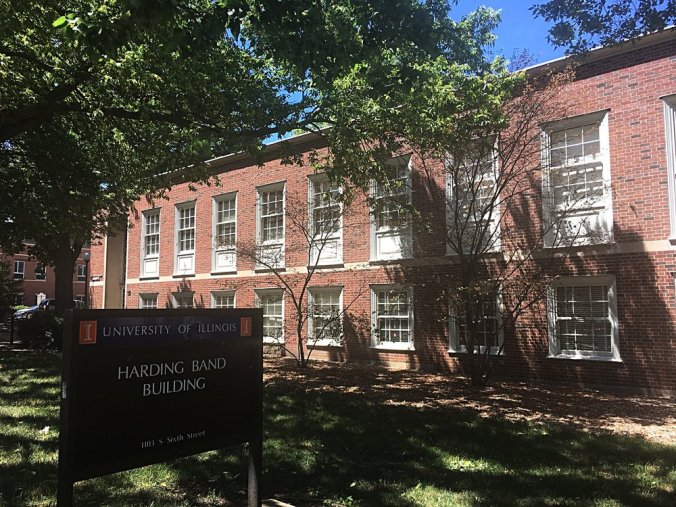
The office in which I had desk for two years is (I think) the third window from the left, on the second floor
When I arrived to Champaign-Urbana, the Illinois Band had only had 4 Director of Bands since 1905. That’s changed in the years since; I swear, I had nothing to do with that…as far as I know. Illinois’ stability was due to two related things: 1.: It is a mountain top job. Once you get to Illinois, you don’t go anywhere else. It’s a career achievement. 2.: because of 1, the people who get that position are REALLY good. So it was when I arrived, with the leadership of James F. Keene. Mr. Keene, and all the directors at Illinois, for the most part, embodied the same ethos. And mind you, it wasn’t just me who encountered this; I think it went for everyone who came in, feeling they were a hot-shot, full of different ideas and brimming with confidence. It’s that scene from Men in Black, but in different words. As Pete Griffin, then the Assistant Director of Bands (Illinois had 4 full-time band directors, his at the time was the 3rd position) said, “That’s great. This is how we do things at Illinois.” It felt pretty much like this:

To put it in collegiate terms, Florida had been those blissful early years of undergrad, where you’re taking general education classes, sampling from all that is out there. Hey, Astronomy….that’s cool! Hey, Novels of the 20th Century…..woo! You’re getting your feet wet in your major. And while Music Theory is hard, it’s also so cool that you’re studying music. You loved band in high school, now you’re studying music in depth,,,,,how great is that?! But after a few years, you get to upper level courses. Everything is now intensely focused, you’re in the core of your curriculum. There are no longer Gen Eds, its all about your major. The classes are smaller because, by this point, the “casual” students have been weeded out. It’s not so much that the courses are more challenging, but the material is much more specific. The assignments are more frequent and longer. And they’re definitely more mentally taxing; answers are not instantly available. What you are working on is directly related to not just your degree, but in the case of music education, your future career. It’s exciting…and daunting at the same time.
So that’s what Illinois was. If Florida was the early years of undergrad, with its smorgasbord of offerings, Illinois was the strict discipline of career preparation. To say it was a tough adjustment was to call Everest a slight hill. Illinois broke me down, swiftly and thoroughly. Humbling, without a doubt, and, looking back on it, I had it coming. I was flying high, after my experience in Gainesville. Here I was coming in with my Masters from a big time University, a veteran of the SEC, a champion of the Swamp….and like Will Smith in Men in Black, it means absolute….well, watch the clip to fill-in-the-blank. A school like Illinois attracts a lot of really talented graduate students, virtually all more talented than me. To separate myself, I had to do something special. Again, it was “play to the crowd,” be the students’ favorite. I shudder with shame when I think of how I treated my colleagues; and I’m pretty sure any challenges I’ve had since were my due recompense. At Illinois the bar was high; Mr. Keene, Gary Smith, Pete Griffin, the music ed folks such as John Grashel and Joe Manfredo were demanding. Not bad people…..no, absolutely not. They did nothing wrong; I just had to up my game. Sleepless nights became common. I had done one all-nighter in my entire undergraduate career….and then had at least four in my two years on campus at Illinois.
It was tough love, and I almost quit after one semester. Like I said, Illinois (at least how it was when I was there) broke you down….but then built you back up, in the Illinois model. Just like at Florida, I was given opportunities to shine. One of my TA-ships was the basketball pep band, and this was the year Fighting Illini basketball was ranked #1 most all season and went all the way to the national title game. Along the way, I picked up some unique traits: donning an orange blazer, I made my own style. Mr. Keene was still a tough taskmaster, but he also let me know (in private, never in front of everyone) that he felt I was doing a really good job. Such a complicated man; there were those individual moments where he could be so positively warm. He had me over to his house for Thanksgiving Dinner one year. But then there were the moments in front of others, where the expectations were made clear, and what I needed to do was to follow them. In many cases, the reprimands I received from Mr. Keene would not be appreciated till later on….much later on. I recall him being quite upset with me for accepting a request from Athletics for a pep band for an event. It was made clear to me, in no uncertain terms, that I could never accept any performance request on my own. At the time, I meekly acquiesced; I just wanted to make sure I was still alive, after all! But years later, when I had my own college job, it became abundantly clear: the more you provide bands for every request, the more the requests come in. The intents may be all well and good, but between respect for over-extended student time and the need to always put a good product out there, you have to say “no.” It’s a lesson I still struggle with today, but it was Mr. Keene, in disciplining in the moment, preparing me for what I would face on my own.
Dr. Pete Griffin is another who I didn’t appreciate at the time, but in every year since, I’ve learned how right he was. He and I did not instantly click; I was headstrong and flamboyant. Pete is probably the greatest living authority on the history of the University of Illinois Bands. Its early days was his doctoral dissertation, for crying out loud. He is a native of the state, and did all three of his degrees at UI. He knew the Illinois way, and took it upon himself to break me down to it. It was tough love, and I resented it. But by the same token….when I did something well, he made sure I knew about it. He provided me opportunities, such as conducting the Marching Illini in the stands (something a TA rarely did). And as the years have gone by (I’m now in my 14th as a college band director), I’ve realize just how good a teacher and mentor, Pete was. He was on my dissertation committee, as was Dr. Joe Manfredo. Both were very tough, but I got through it. I may have resented the Illinois way at the time, but in looking back now….it was exactly what I needed. Florida had opened up to me what college band is like on the Director side, and made it a tantalizing goal to pursue. It seemed just in my reach. Illinois knocked me down and then built me up. It installed the personal and professional discipline that I absolutely needed if I was going to be a college band director. The need to heighten my expectations, and demand more of myself, while at the same time, still embracing my enthusiasm and style that was my hallmark. Both were irreplaceable in my experience. Without Illinois, I would absolutely have failed on my own. I would’ve made a rash mistake, I would’ve rush into something, I would’ve squandered away my responsibilities. And without Florida, I would have been bland, I would never have set my sight on the goal. I would have never reached for it in the first place. They both made me what I am today, for better or worse.

With the Illinois Basketball Band at the 2005 Big 10 Tournament
I know what you’re saying….this blog was to be a way of thanking the graduate students, who missed out on that opportunity with our April concert being cancelled. And yes…I’ve taken too long to get to this. But here’s thing: through all my experiences as a graduate assistant at Florida and Illinois, the good times and the ones more painfully remembered…I always thought to myself, when I have my own gig, what is my responsibility to my own grad students? David Waybright, Matt Sexton, Mr. Keene, Pete Griffin, Gary Smith, Tom Caneva all gave me opportunities that made being a college band director possible. So when it’s my turn to “pay it forward”, how would that go?
Well, I guess for the answer to that you’d have to ask the grad students themselves. Let’s see if I can list all of them, from my 14 years of teaching. At Fresno State, I had:
Tim Walsh, Sarah Basiletti, Adam Wilke, Jose Vargas, Emily Willingham, Alan Moffett.
At UMass, I’ve had:
Justin Falvo, Charlie O’Brien, Megan Cooney, Aaron Staluppi, James Shetler, Matt King, Colby Vasquez, David Morris, Matt Sypek, Jared Bloch, James Minnix, Jose Ignacio Blesa-Lull, and Britney Alcine.
First off, I know the experience I’ve provided them isn’t the same that was provided me. For starters, UMass is not in the Big 10 or the SEC. While there have been some exciting sports moments and we’ve done some really amazing things, I don’t lead the band in games against Michigan or LSU on a regular basis. It is what it is.
The next big difference between my experience as a TA and what our grad students receive: I, as the band director, am much more “hands on” than Matt Sexton, Gary or Tom Caneva were. At both Florida and Illinois, TAs were the only ones who were leading the band at basketball games. At Fresno State, it was about even between how many games I led the band at and how many TAs did. At UMass, I tend to do the majority, and definitely all of the rehearsals. A grad student may get to to take the band on trips; Colby, Charlie, Jared and James Minnix have all been the band director of record on pep band trips to the conference basketball tournament, and James also took the band to the NCAA Hockey “Frozen Four” last year. Originally, I figured I’d do the games myself in my first couple years, just so I could establish myself. You know, be seen as the band director for those who didn’t know me. And then…it sort of became a habit. I found I like doing the games. The same goes with calling up tunes in the stands at football games. While the drum majors do the conducting, it’s the director who decides what is played. I typically try to give this responsibility to the TAs….but more often than not, I take it back. I guess, I have this image of what the band should be like in the stands, and until that’s achieved, I just have a hard time letting go. Something to work on, for sure.

Me and Pep Band
The grad students here are just like me circa 2002. Typically, they are working on their Master in Music in Wind Conducting. Most of them have taught band in the public schools before going to grad school. Some of them are open about their ambitions to be college band directors. Dr. Westgate gives them individual conducting lessons supervises them when they conduct the Wind Ensemble and Symphony Band. The grad students receive instant feedback. You can’t have a thin skin in a graduate conducting program; you’re up there in front of an ensemble of undergraduate students, you’re trying to be the leader (for the moment), and the Big Cheese is there too. And he has no reservations about correcting you, in front of those students. It’s all designed for growth, and I have to hand it to Dr. Westgate; every one of our grad students has made progress as conductors in their two years here. Now, that progress may be measured in different ways; after all, not every conducting student enters with the same skill set. Some are already more advanced at the starting point. But every one of them has matured as a conductor in their time in the program.
I don’t teach conducting. What I do is invite the grad students to conduct a piece with Concert Band. That is a truly unique experience, which I think is valuable to their development. Conducting the UMass Wind Ensemble is like driving a Ferrari or any other high-performance automobile; it responds to the slightest touch, and requires really developed skills to handle all its power. Concert Band, on the other hand, is a Mack truck. First off, it’s HUGE. We typically have from 120 – 150 people involved. And like that truck, you’re pulling a wide load. The tops of most sections are very strong, players who could easily be in our of our auditioned groups. But at the bottom of the section, you have many who don’t want to audition, but are glad to take last chair. The problem is…last chair is already reserved for those who are learning a new instrument. That’s all well and good; God love you, exploring something new. But being able to put together a concert that will a.) be attractive to audiences, b.) rewarding to those who have experience and c.) keep involved those who are writing down the slide positions in the music…..that’s a delicate balance . Truthfully….that’s probably the only thing about Concert Band that is delicate. To steer a Mack truck takes a strong grip, lane changes aren’t subtle, and just getting off the freeway takes planning. Everything you do as a driver affects a LARGE number of people. And to park….that usually requires. Yeah, that’s what conducting Concert Band is like.

UMass Wind Ensemble is more like this….

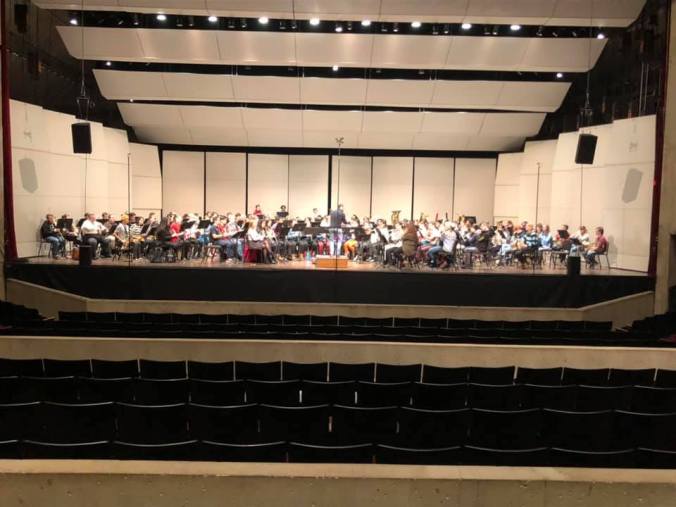
Meanwhile, Concert Band is like….

Except, less spiffy
That’s why it’s so important for our grad conductors to work with Concert Band. It requires an entirely different teaching approach. Just being heard can’t be taken for granted. You rehearse Wind Ensemble at UMass, you’re in a regular sized room, less than 50 people in there; it’s easy to be heard anywhere. Not to mention, everyone is (more or less) engaged; tough to look around or be on your phone in such an intimate setting. Then you get to Concert Band. First off, you’re in the Big Room of the George N. Parks Minuteman Marching Band Building (GNiP, for short). The Big Room owes its monicker because….well, it’s a BIG ROOM. Cavernous might be more like it….and Concert Band takes up quite a bit of it. But because the Big Room is so large, you can space out 150 or so band members; people aren’t on top of each other. There’s usually 7 arcs, each with around 20 people (more or less) in them. From where the conductor stands to where the percussion are is about the breadth of the Grand Canyon. Meanwhile from one end of an arc to the other terminus typically crosses time zones….or, at the very least, town lines. It’s not intimate; while not exactly socially distanced, you do have some room to be comfortable (unless you’re a flute. That instrument is just awkward). So the point is, with that many people in that large a space, just holding the band’s attention is a challenge. Very few are music majors, and the ones that are are typically on a different instrument. People participate because the social aspect; they’re making music with their friends. It’s less about art, and more about the experience. I don’t know if that’s good or bad, I just know it’s a thing. I’ve adapted to it, and if I might be so bold, somewhat thrive in it. I get the mindset, and so have developed a teaching manner that (hopefully) is able to keep order, and provide enjoyment. You’ve got to motivate people, keep them entertained and interested, but at the same time, maintain an environment that keeps 150 focused. And that’s something completely different than what our grad students experience with Wind Ensemble or Symphony Band. Some have done better than others, but for all of them, I think the experience is invaluable. They have to learn how to musically communicate with a wide array of students, not just with the best ones.

A couple of arc in a Concert Band rehearsal. Notice how you can’t see where they end….
I should add, there is a reverse effect to this. For, in the few times I’ve gone over to guest conduct Wind Ensemble and Symphony Band, I find myself horribly uncomfortable. I liken it to a stand-up comedian who is just dying on stage. All my irreverent comments seem to draw dead stares, and the players don’t need my encouragement to get through the music. When you can sight-read what’s in front of you, you don’t need a cheerleader. Plus, between the Concert Band, the UMass Marching Band (which is usually between 370 – 400), and our summer Amherst Community Band (85 or so)….the UMass Wind Ensemble seems so small. Give me a band with 80 players minimum or don’t waste my time. Well actually, I was probably the one wasting the Wind Ensemble’s time….but anyway!
As I mentioned, when the grad students conduct Wind Ensemble or Symphony Band, Dr. Westgate is there with them, providing feedback. I tend to not do that; I’d like to say I play the policeman in Concert Band while the TAs are conducting. Which is true….sometimes. I do admonish the band to pay attention, and ask students to put their phones away. But I also walk around and crack jokes with students. Remember that part about back when I was a TA, always wanting to be the band’s favorite? Yeah….old habits die hard. I also tend not to interrupt the TAs with feedback because, frankly….I’ve never been really confident in my own conducting/musical abilities. There’s talk in our profession of “imposter syndrome,” the questioning of whether we really belong. My answer to that, and I still hold to this, is if I’m getting a paycheck, then I belong. Still, I’ve never been the greatest of musicians, so I tend not to view myself as some expert in the wind band/conducting field. I figure the grad students get plenty from Dr. Westgate; let them figure out Concert Band on their own. Whether that’s right or not, I guess you’ll have to ask them. After all, I already put their names in this blog!
So what do I provide for our grad students, since they are primarily Dr. Westgate’s responsibilities? I think back to what I received when I was in their shoes, as a Masters student at Florida: opportunity and (hopefully) friendship. That’s what Matt Sexton gave me. I think that’s the “pay it forward” that I owe to all the graduate students who go through our band program. I got here because Matt Sexton, David Waybright, James Keene, Pete Griffin, Gary Smith and Tom Caneva gave me opportunities and mentorship. Each did it differently, each in their own ways. With Matt, it was a buddy relationship; there was a personal side to this college band thing. With Dr. Waybright, it was the room to stretch my wings, the stage to perform on. Mr. Keene brought a cold dose of reality and the need to own up to expectations. Pete Griffin was finding your place and working with others. I owe so much to all of them, and while (I hope) I’ve thanked them for it, the best way I can repay my mentors, is to give the same to those coming up behind me. Sure, I might not be the teacher of record for a Masters in Wind Conducting student….but just by what my responsibilities are (all the Athletic Bands at UMass), I do have something, at the very least, I can share,
But I need to say this: so far this seems like a one-sided relationship, me as the benevolent despot, freely sharing my largesse with the paupers. That couldn’t be more false than if you said Napoleon Bonaparte built the Taj Mahal. In reality, my relationship with our graduate students is a symbiotic one. You know, the ones where both parties benefit? Sort of like this one:
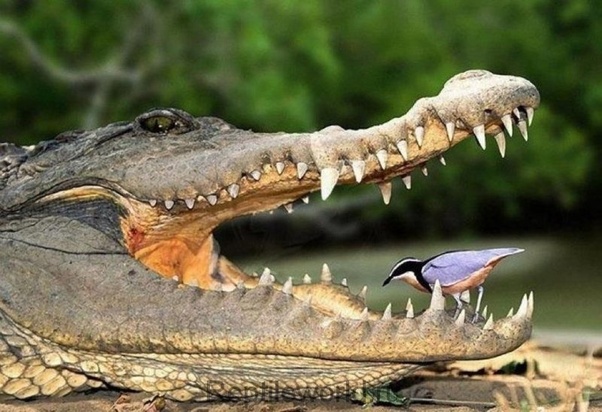
Okay, I picked that picture because, hey, it’s an alligator and I’m a Florida Gator! The point is, the alligator isn’t going to eat the bird. It opens its jaws and the bird picks the alligator’s mouth clean of food scraps it can’t get to. The alligator gets a clean mouth and the bird gets to eat. Both benefit.
The difference between the alligator and the bird is, their relationship is mutually beneficial. My relationship with our graduate students, on the other hand, is highly one-sided….and it is I who is in the deficit. For the price of providing an assistantship, I’ve been enriched by getting to know colleagues who bring something unique to our band, our institution and to me. It’s true that each student can impact their teacher. The problem for me is, I have A LOT of students. Between marching band, concert band, and the pep bands, I probably have around 600 different students every year. While I strive to know all their names, let’s be real: it’s a much smaller number that I actually get to know. If you’re a student leader in the band, like a drum major or band manager, I obviously get to know you well. But that’s something like 6 students. If you’re not hanging around the Band Building on a regular basis, chances are, our engagement is limited. And let’s also face it; there is that great student/teacher divide. Rhe rules of social engagement are somewhat different in college than in high school, since you’re not dealing with minors. But there’s still a gap between undergrad and professor. For starters, there’s the age difference. Even if I wasn’t their teacher, I, a 46 year old, am not looking for a social life with 19 year olds. It’s one of the reasons I’ve cut back on going on the over-night pep band trips. I don’t really enjoy the free evenings, since I’m not looking to hang out with the students.
But with the graduate students, it’s different. Though none of them are in their 40s, and they’re typically not married, they are closer to me in life-experience/age. There’s also much fewer grad students compared to the undergrads, only a couple a year. We’ve shared somewhat similar experiences: they have an undergraduate degree, and most have done some teaching. Basically, they’re in the same place I was in 2002, when I went to Florida. But the biggest difference between undergraduates and graduates, the latter have done something of life. It’s why I feel its so important to go out and teach for some years before going back to school for graduate work. How are you going to refine skills that you’ve yet to use? Get out there on your own, do life, give it your best go, stretch yourself, fail and pick yourself up, build something, make something your own….and then come back to school, so you can get what you need to get to that next level (whatever you define that as).
And that’s what makes working with our graduate students so rewarding. Each of them brings something unique, something I didn’t previously know, and have learned from. Believe you me, from each of our graduate students, I’ve not only learned something, I’ve become a better person. For any one thing they gained from me, I’ve probably received ten-fold from them. Here, let me count the way! And a warning to all my former TAs who might be reading this, there’s now way I’m going to be able to include everyone. So if you are not mentioned here, please take no offense. You still have impacted me in a way I will always be in your debt.
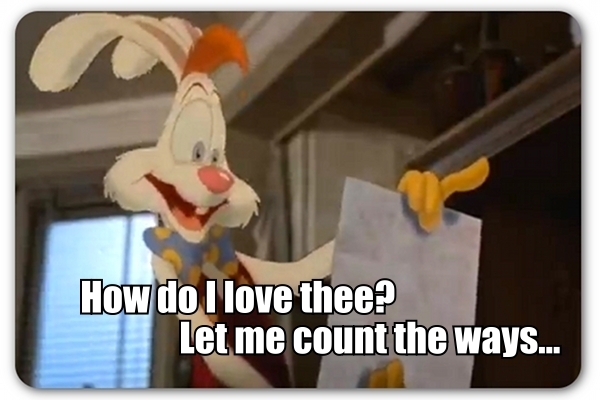
From Megan Cooney, I’ve learned tenacity, combined with flexibility. Making something truly great out of less than ideal circumstances. Altering your vision but not compromising your values.
From Charlie O’Brien, I’ve learned so much about human connections. Don’t be hung up on who you think people want you to be; rather, just be yourself. Let people see how weird and crazy you can be. Don’t be afraid to make a fool out of yourself. People learn when they laugh.
From Jose Vargas, I learned poise. No need to rush into anything. Take a minute. Learn to assess the situation. Not everything needs an answer right away. Learn from the moment.
From James Shetler, I learned much about the value of tradition, of ritual, of the past. James started grad studies in my 3rd year at UMass. He had been a drum major under my predecessor, the legendary Prof. George N. Parks. From James, I learned a better appreciation and understanding for what Prof. Parks had done and meant. And when Dr. James Patrick Miller, our wind ensemble conductor before Dr. Westgate left, I learned from James (who stayed in the program) the importance of persevering, an open mind, and “going with the flow.”
From Colby Vasquez, I learned attention to detail, a step-by-step process to teaching, the importance of having a method, of not skipping the basics. Colby may have thought he brought a new teaching approach to the marching band at UMass. But in reality, he brought to me a new way to teaching anything.
From Tim Walsh, my first-ever TA, I learned the importance early on of choosing my words carefully. No need to snap at someone. If something didn’t reach your outcome, perhaps you weren’t clear in your instructions. Never assume what makes sense to you is coming out the same on the other side. Value people over results.
From Emily Willingham, I learned the importance of enthusiasm, of passion, of a cheery disposition. Of treating every day as a gift and something to celebrate.
And lastly, from Matt Sypek, I learned perseverance, calm demeanor, taking everything with an even keel, being a good man, loyal to those around you, treating everyone well.
I could go on, but I think you get the point. Every single graduate student I’ve worked with has enriched my professionally and personally. Their title might be student, but they’re teaching me. I think back to the 2012 Midwest Clinic. For those that don’t know what the Midwest is, check out my blog from a few years back. The UMass Music Department always maintains a booth in the Exhibit Hall. Here’s a pic from this past December:

Left to right: graduate student Britney Alcine, me, graduate student Jose Ignacio Blesa-Lull, undergraduate Rongbing Shen, and Music Department recruiting director Nate Gowen
Our grad students help run the booth, and in return, we (the band and the Music Department) help with their expenses. Above, you’ll see graduate students Britney Alcine and Jose Ignacio Blesa-Lull. The Midwest Clinic runs Wednesday – Saturday, and Tuesday is the set-up day for the exhibitors. Because the graduate students have been doing all the work, I typically treat them to dinner that night; that’s a tradition that’s been going on since….well, since 2012. So that Tuesday evening, I was taking grad students Aaron Staluppi and Megan Cooney to dinner. Neither were too familiar with Chicago at the time, and from my time at Illinois, I knew it pretty well. I had a list of places I wanted them to see, starting with drinks at the bar at the top of the John Hancock Building. What a view of the amazing city and hey….alcohol! So as we were walking, one of them, I can’t remember if it was Aaron or Megan, asked why I was being so nice to them. My response was….”Well….because you’ve been nice to me.” I don’t want to get into the history too much here, but my hiring at UMass wasn’t exactly what you would call “smooth” (said in a Jackie Gleason manner). You can do the research on your own….I’ll leave it at that. With a decent number of the band, I wasn’t exactly “Man of the Year.” So those two graduate students, Megan and Aaron, being nice to me….that meant so much. Drinks in a skyscraper bar….the very least I could do. Their help with the teaching of a college band program was worth more than a drink. But it was the personal touch, the kindness that they brought to me that meant so much more than anything they did musically.
That has continued to be the case today. I am under no illusions of what people might think of me. As the band director, I have to make tough choices sometimes, ones that I know may not be understood or popular. It comes with the job. Being liked is great, but it’s not the be all/end all of my job. I’ve become more hardened than I was back in 2012; while I wouldn’t say dislike runs off my like water on a turtle’s shell, I don’t lose sleep over it like I once did. But as to what the relationships with the graduate students means to me? That’s never wavered. Each one continues to bring something new into my life. Our current TAs, James Minnix and Jose Ignacio Blesa-Lull, continue that. They’re the ones in the featured picture for this blog. James is very much into fitness, and I’ve enjoyed discussing different routines. I’m an amateur gym rat; James is very much the professional. Jose comes to us from Spain, and so that alone has widened my knowledge. I’ve enjoyed our chats, ranging from Spanish food to Francisco Franco. Jose is also a published composer, so that’s been a unique perspective. I’m a deeper, richer person for having worked with Jose and James. I hope for them, I’ve provided experiences that have been beneficial. I don’t know if either of them see careers directing collegiate marching bands in their future, but I hope they’ll look back on their two years here and feel it was something positive. That’s my hope for every graduate student I’ve had the pleasure of working with, that they gained something from the opportunities. Their professional growth was under Dr. Westgate’s tutelage, but I hope my little corner of it was something they found beneficial. But they should all know, I was the true beneficiary.
That was kind of the point of this blog. At our April concert, I would’ve recognized James and Jose on-stage. They would’ve received the applause of both the audience and the band, and I would’ve presented each of them with a UMass polo. Don’t worry, boys, if you happen to be reading this; you’ll still get your shirt. With the UMass Marching Band, we make a great deal about our seniors. They’re introduced at the final football game, get to conduct a number in the stands, and even have a final, seniors-only, field show at postgame. At the Band Banquet, each senior gets to say something. It’s all a wonderful tradition. Our TAs don’t get as much. Now….they’re only here for 2 years, rather than the 4 (or 5) that an undergrad might put in. And they’re not on the field, wearing the uniform, marching and playing (and sweating). They get to dress comfortable on game days. Though I will say, on hot Florida game days, I always wore long sleeves, since the band did too in their uniforms. But the point is, it’s never the same experience for the TA as it is for the band members. And while we are unfailingly in acknowledging all our undergrads do (heck, we couldn’t have a band without them; they ARE the band!), the grad students need credit too. It’s hard to say what their impact on the program is; I’m sure it varies from student to student. But for me personally and professionally, I can speak unequivocally what having grad students means. I’m a better teacher, musician and person for having worked with……well, each and every grad student that’s been here, from Adam Wilke to James Minnix, Jared Bloch to Justin Falvo. Each has made me better. And this fall, when Samantha Fowler joins us (the first female wind conducting Masters student since 2014), I’ll be even more enriched.

Former grad students, left to right: Megan Cooney, Aaron Staluppi and Charlie O’Brien
All of our former graduate students are employed in teaching, all in the public schools, save Megan, who is at St. Ambrose University, where she has started a marching band from scratch. I can assure you, she owes NOTHING to me on that. I was a hot mess when she was a grad student here….now I’m more of a lukewarm mess. I think that’s improvement. As of this writing, none of our former Masters students during my time have gone on to doctoral programs. I think that will be changing soon, but hasn’t happened as of now. None of that really matters, though; every one of them could be conductors of the finest groups in the country and it still wouldn’t matter. Each of them has impacted me professionally and personally, and I am that much better for their sharing of their lives for two years here at UMass. I can only hope what little I had to offer was worth it to them. And to Dr. Waybright, Matt Sexton, Mr. Keene, Gary Smith, Dr. Caneva, Pete Griffin, Joe Manfredo and everyone who got me here today…..this is how I repay you. So to Megan, Jared, Jose, Adam, Tim, Matt, David and the rest…that will be your trust, to pay it forward for the next group. Let’s keep this chain alive!
And until then, to Jose and James (and to all those who did get a chance to be recognized….and more importantly, receive their shirt), THANK YOU!
Here’s your (virtual) shirt:
